Search titles
Displaying results 1 to 10 of 282.
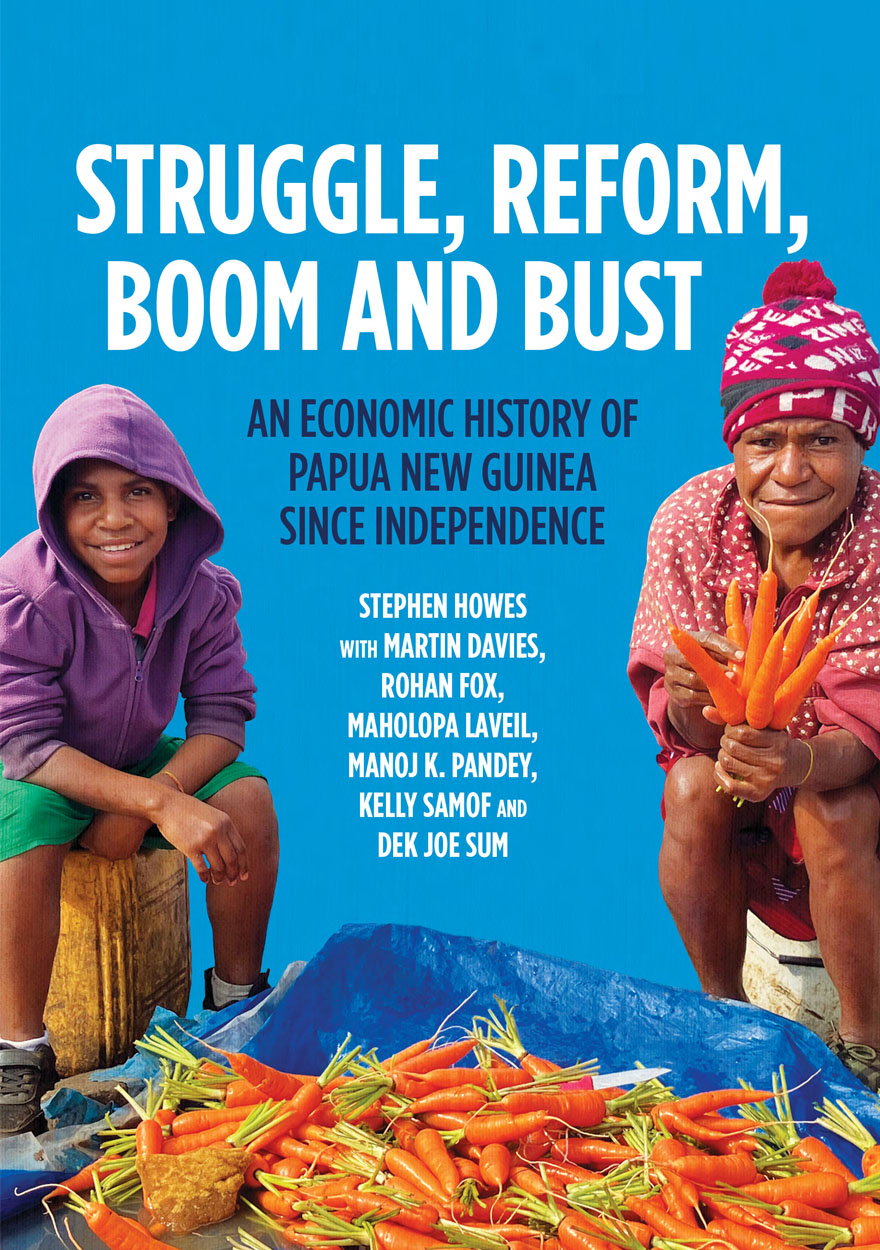
Struggle, Reform, Boom and Bust »
An Economic History of Papua New Guinea since Independence
Authored by: Stephen Howes, Martin Davies, Rohan Fox, Maholopa Laveil, Manoj K. Pandey, Kelly Samof, Dek Joe Sum
Publication date: 2025
Since Papua New Guinea’s independence in 1975, economic growth has been slow but volatile, with major changes in economic structure and policies, as well as in politics and governance.
This economic history, written to commemorate the fiftieth year of independence and the first to be produced in some 15 years, divides the half century since independence into four periods: the relative stability but also early struggles of the seventies and eighties; the crises and reforms of the nineties; the boom of the 2000s; and the quiet bust of the 2010s. Two chapters cover each period’s major economic, policy, institutional and political developments. The final three chapters provide an overall assessment of economic performance and policies since independence and link them with its politics and institutions.
The book combines painstaking documentation with original analysis to reveal both the strengths and weaknesses of the PNG economy, and theorises that the country’s hyper-politics and insecurity have combined to produce, and are reinforced by, a weak but stable state, and low and increasingly resource-dependent growth.
Data-driven, frank, insightful and engaging, Struggle, Reform, Boom and Bust is written by an expert team of economists from the University of Papua New Guinea and The Australian National University under the leadership of Professor Stephen Howes, Director of the ANU Development Policy Centre. It is an essential resource for anyone interested in the economy of Papua New Guinea, as well as an important contribution to the literature on the challenges and institutional determinants of post-colonial development.
Coming soon
Notify me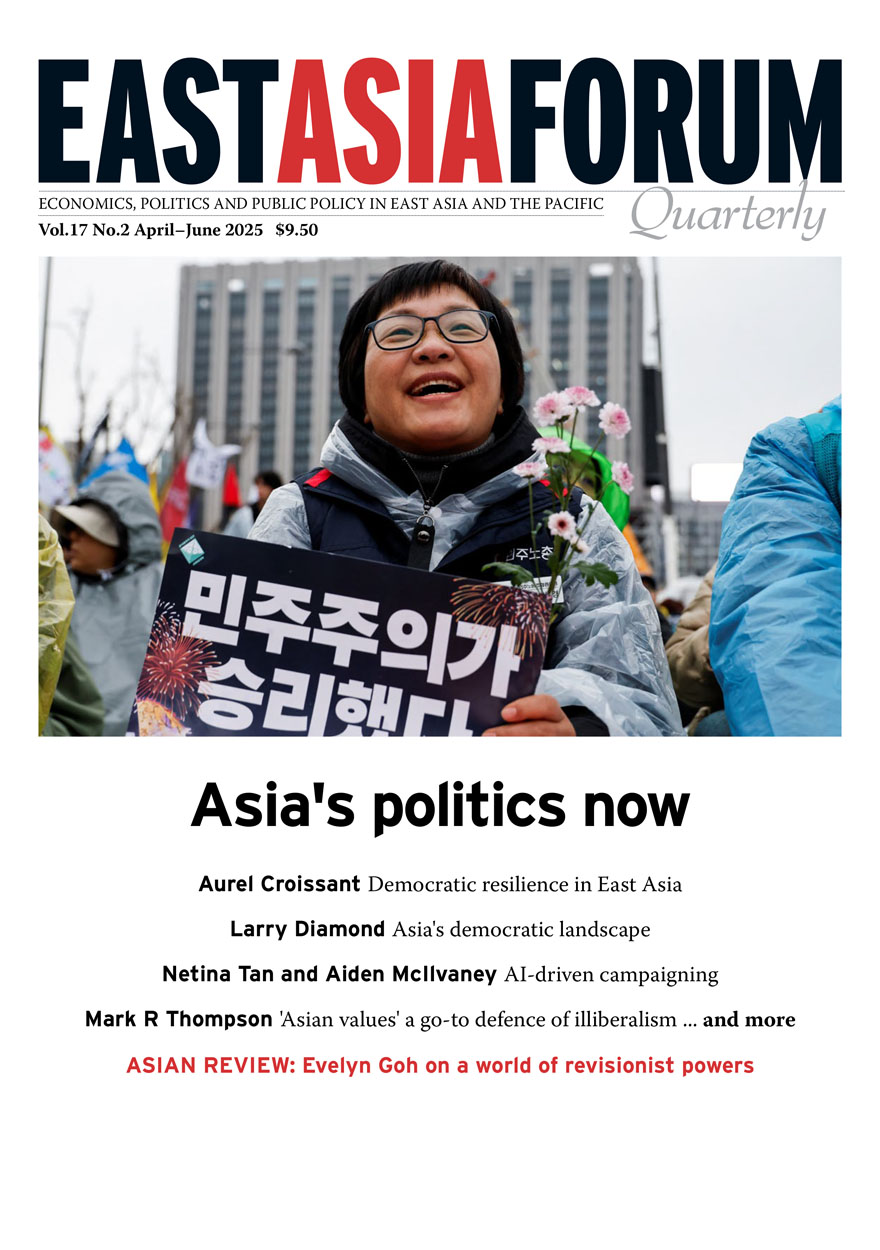
East Asia Forum Quarterly: Volume 17, Number 2, 2025 »
Publication date: May 2025
Asia is home to some of the world’s most diverse political systems—from liberal democracies to authoritarian regimes and hybrid states. As global democracy faces renewed pressure, this edition of East Asia Forum Quarterly explores how political systems across Asia are evolving amid rising autocratisation. It examines why economic development alone cannot explain democratic outcomes in the region and how authoritarian success stories are reshaping debates about governance. With ideological contestation intensifying, Asia is not just adapting to global political trends—it is helping to define them.
Download for free
Not available for purchase

East Asia Forum Quarterly: Volume 17, Number 1, 2025 »
Publication date: March 2025
The global landscape has shifted dramatically since Donald Trump’s return to the presidency in January 2025. His decision to exit the Paris Agreement and impose heavy tariffs has escalated uncertainty surrounding both climate action and the global economic order. This edition of East Asia Forum Quarterly explores how ASEAN and its regional partners can step in to safeguard multilateral trade and climate cooperation, advocating for green trade policies and sustainable investment. The region has the potential to reshape the global response to climate change and maintain economic stability through strategic collaboration.
Download for free
Not available for purchase
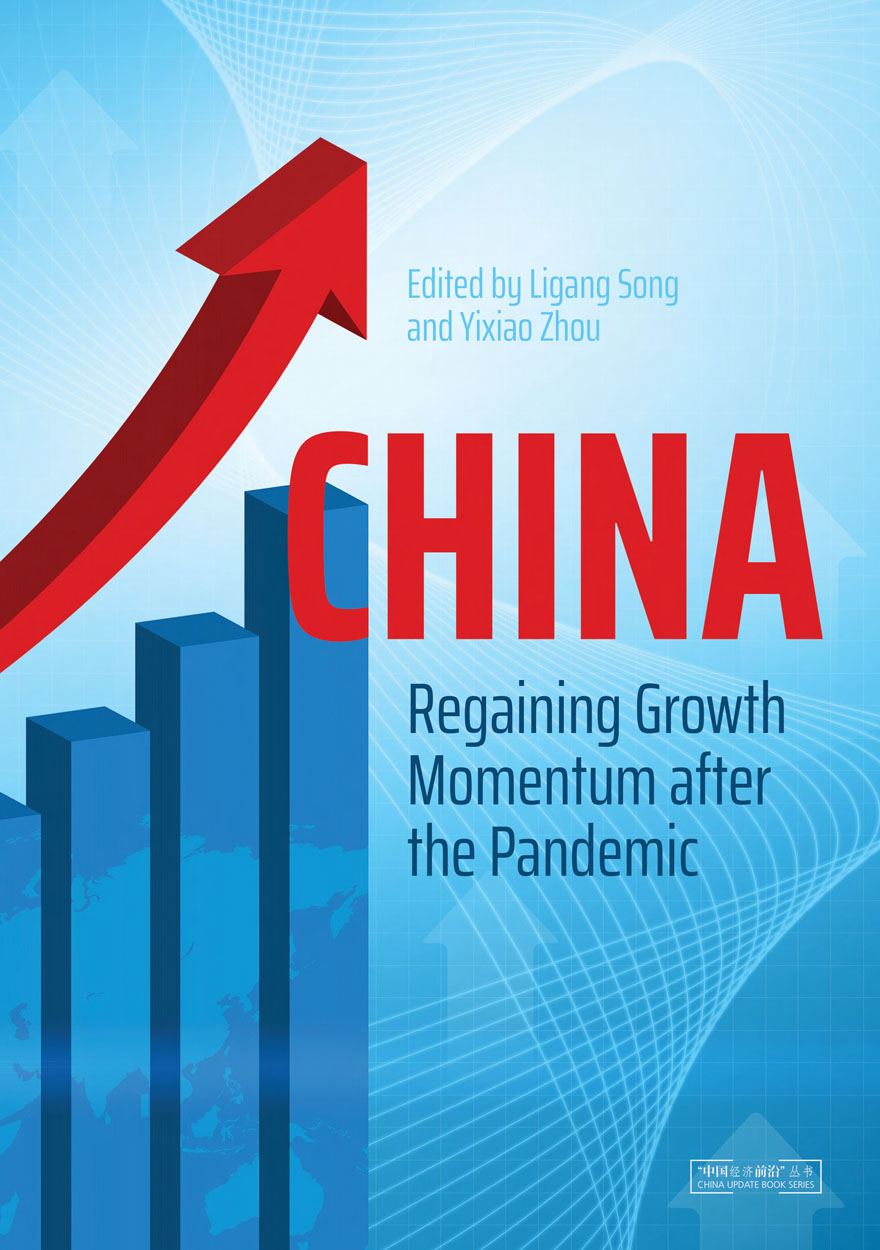
China: Regaining Growth Momentum after the Pandemic »
Edited by: Ligang Song, Yixiao Zhou
Publication date: December 2024
The slower growth of the Chinese economy in the aftermath of the pandemic has prompted the Chinese Government to adopt measures to boost domestic consumption and deepen structural reform, with the effectiveness of such policies beginning to be felt. However, China still faces challenges that will affect its growth dynamics down the track. These include the slowdown of its real estate sector, the complex internal and external environments for macroeconomic policy, the high level of income inequality, weak growth in investment by the private sector, negative population growth, high levels of debt, deglobalisation, weakness in the financial sector and equity markets, the inadequacy of its fiscal system and the imperative to decarbonise the economy. China must confront these challenges to maintain growth momentum and achieve higher levels of income and living standards.
The theme of the 2024 China Update book is China: Regaining Growth Momentum after the Pandemic. It discusses some of the challenges and policy issues that are being watched with keen interest by decision-makers and markets alike, including: What are the obstacles to economic growth in the aftermath of the pandemic and how can these be overcome? What are the key challenges and opportunities for China to move to the next level of development against the backdrop of negative population growth? Is it time for a Tax-Sharing System Reform 2.0 to consolidate China’s fiscal position? What are the challenges facing China’s small and medium enterprises? How is China’s business environment faring, and what are the implications for investment? How does China’s urban housing affordability impact its low fertility rate? How will the trade conflict between China and the United States play out regarding semiconductors and other high-tech products? How does China–Africa bilateral agricultural trade impact on African rural transformation?
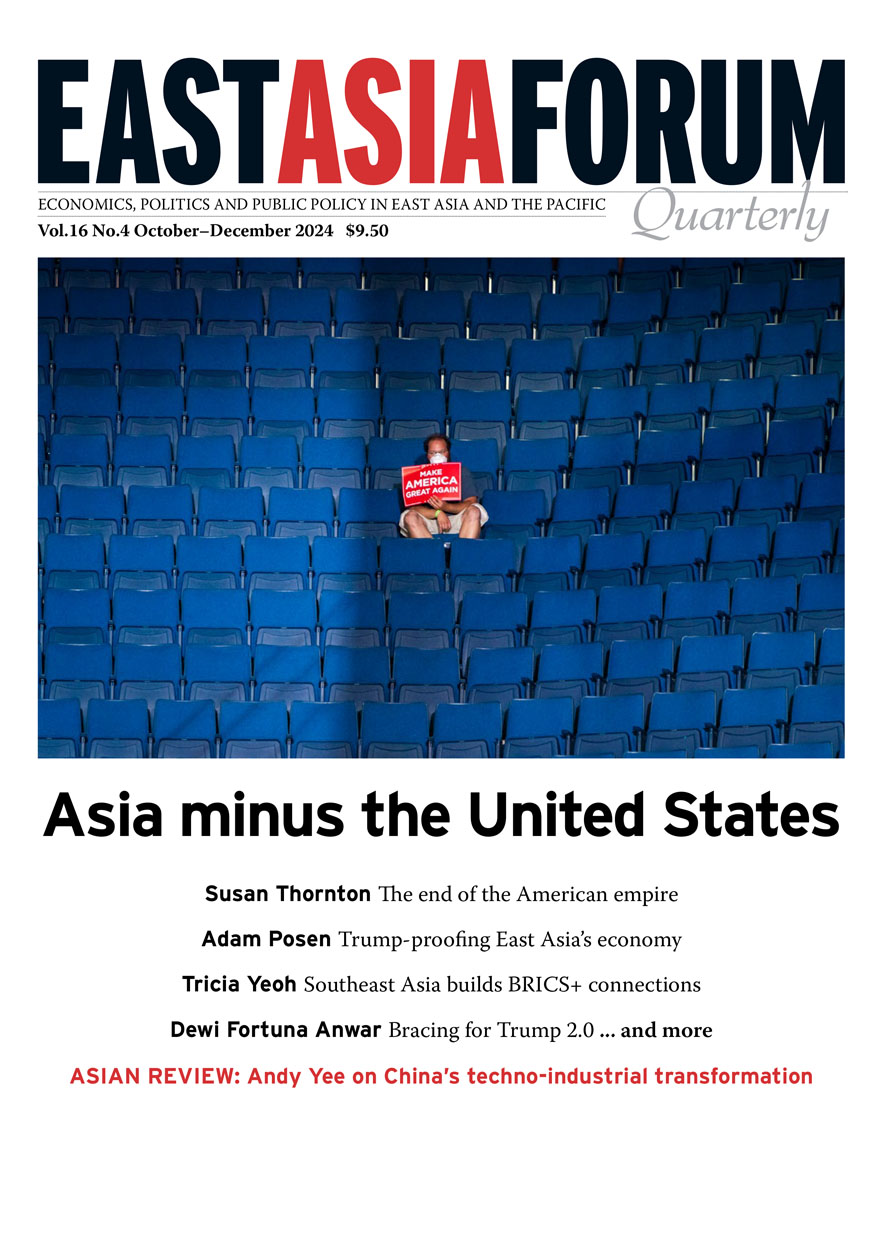
East Asia Forum Quarterly: Volume 16, Number 4, 2024 »
Publication date: December 2024
The global economy’s trajectory toward instability has been evident since Trump 1.0. A second Trump presidency will likely amplify protectionism, strategic competition and global disorder. This edition of East Asia Forum Quarterly examines how Asia can respond, emphasising the region’s role in defending multilateralism, addressing climate change and ensuring global stability.
Download for free
Not available for purchase
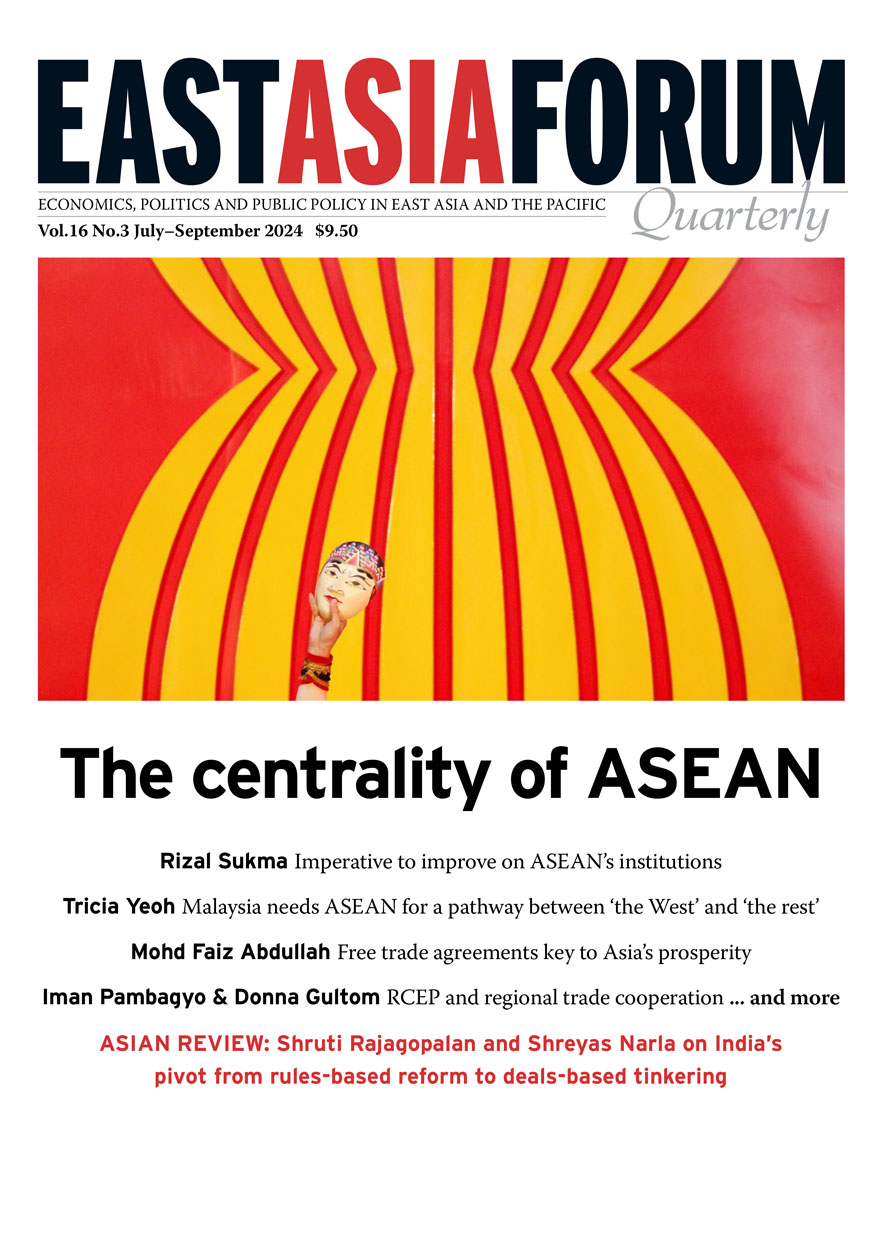
East Asia Forum Quarterly: Volume 16, Number 3, 2024 »
Publication date: September 2024
ASEAN's rise as the cornerstone of regional diplomacy and security in the 1990s may have seemed improbable, but it was crucial. Today, a shifting regional geopolitical landscape challenges ASEAN’s relevance. Great power competition and waning global political commitment to multilateral arrangements threaten its role as East Asia’s 'steering committee'. This edition of East Asia Forum Quarterly explores how ASEAN can maintain its centrality, calling for proactive leadership and stronger regional cooperation.
Download for free
Not available for purchase
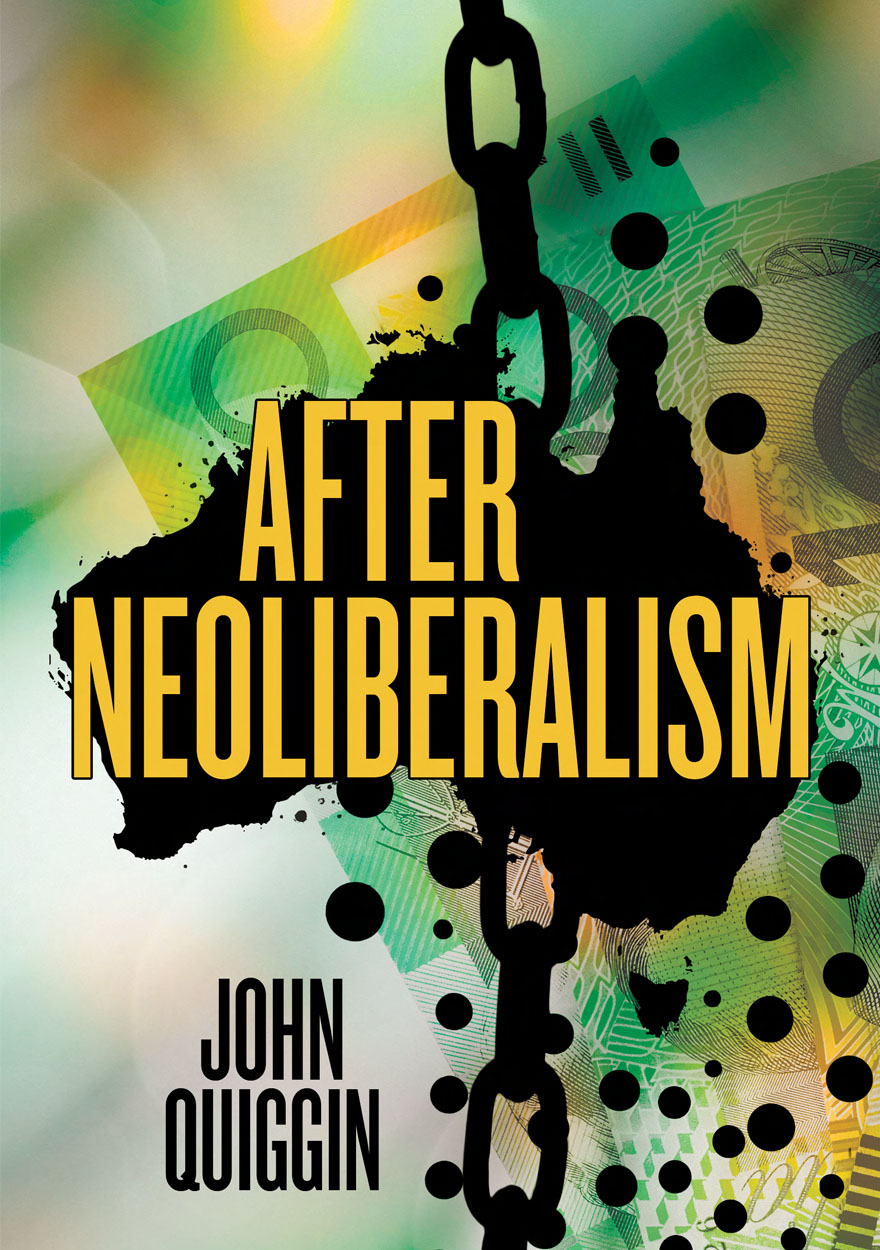
After Neoliberalism »
Authored by: John Quiggin
Publication date: July 2024
Since the early 1980s, Australian economic policy has been dominated by the ideology of neoliberalism (also known as ‘economic rationalism’), including policies of privatisation, financial deregulation and micro-economic reform. Throughout this period, John Quiggin has presented critical assessments of neoliberal policies and the claims about productivity growth made in support of those policies.
The credibility of neoliberalism was fatally wounded by the Global Financial Crisis and its aftermath. Nevertheless, market ideology has lumbered on in zombie form, for want of a clear alternative. It is only recently that we have begun to reverse the failed policies of privatisation and deregulation and to consider radical alternatives such as a shift to a four-day week.
This book provides a historical perspective in the form of a series of articles written from the mid-1980s to the present day. It concludes with some suggestions for the way forward, after neoliberalism.
‘John Quiggin is the intellectual equivalent of a dazzling fireworks display. I walk away from every encounter with a bright new insight, and this book is no exception. Agree or disagree, Professor Quiggin is a veritable trove of fresh insights. Spanning nearly four decades, this volume brings together some of Professor Quiggin’s most provocative contributions, driven by a deep commitment to equity. It will pique your curiosity and encourage you to work towards a better world.’
—Andrew Leigh, Parliamentarian and author of The Shortest History of Economics
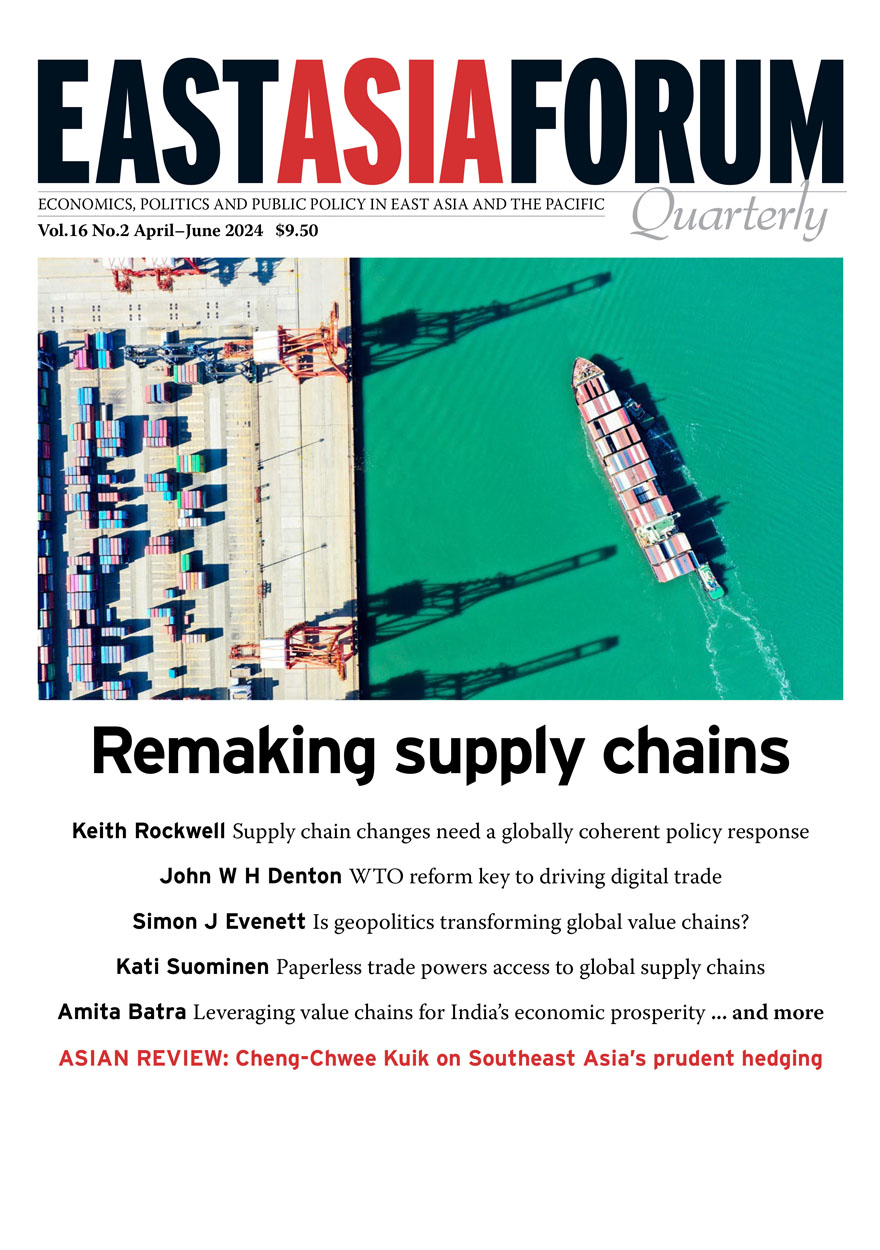
East Asia Forum Quarterly: Volume 16, Number 2, 2024 »
Publication date: June 2024
Key in globalisation, supply chains connect producers to consumers across nations and specialisations. Recently, geopolitics, the COVID-19 pandemic and European conflicts have reshaped these networks. Supply chains are increasingly influenced by statecraft and protectionism, moving away from multilateral cooperation. This issue of East Asia Forum Quarterly explores the rapid transformation of supply chains, the paradox of digital innovation in trade and the consequences of economic isolationism.
Download for free
Not available for purchase

East Asia Forum Quarterly: Volume 16, Number 1, 2024 »
Publication date: April 2024
As India charts its post-colonial journey, its pursuit of great-power status intensifies. This issue of East Asia Forum Quarterly delves into India's regional and global positioning, exploring avenues to leverage its economic, demographic and geopolitical advantages. Key insights highlight India's subordinate role to China in the Asia-Pacific, the need for job creation in manufacturing, revamp education and seize opportunities in global manufacturing. As India heads to the polls, its future trajectory hinges on addressing these complexities.
Download for free
Not available for purchase

East Asia Forum Quarterly: Volume 15, Number 4, 2023 »
Publication date: November 2023
It’s back: the past decade has seen a remarkable resurgence of industrial policy in the developed world. Geopolitical fragmentation and resultant suspicions of international trade, the politically induced adoption of second-best industrial policies to address carbon emissions, and the use of manufacturing incentives sparked by fears of deindustrialisation and widening inequality risk tit-for-tat protectionism and further splintering of the global economy. This issue of East Asia Forum Quarterly examines what the new enthusiasm for industrial policy activism means for the global system and Asian economies: exploring its effects on the ability of emerging Asian economies’ to break into manufacturing in global value chains; investigating how measures aimed at encouraging domestic processing of raw materials affect the stability of policy environments and green industrialisation; detailing and comparing the experiences of major regional economies with policy developments in semiconductor and electric vehicle manufacturing and renewable energy; and appraising industrial policy’s effects on smaller economies and the rules-based trading system from a global perspective.
Download for free
Not available for purchase



